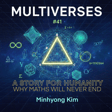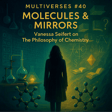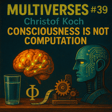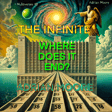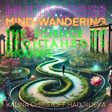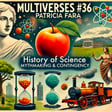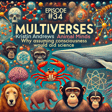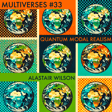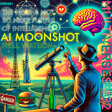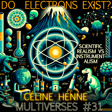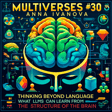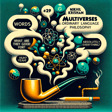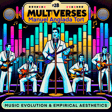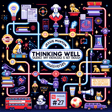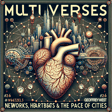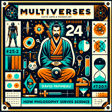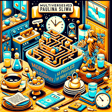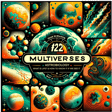The Divide and Connection Between Poetry and Science
00:00:00
Speaker
Poetry and science can both seem inaccessible. They often employ obscure language or terminology. It can even seem that they're not interested in engaging audiences. And they can seem to have very different intentions. On the one hand, poetry seems to be about subjective self-expression and science about the objective representation of the world. I guess today, Sam Inlingworth challenges these assumptions. Sam is an associate professor at Edinburgh Napier University.
00:00:29
Speaker
He's pioneering ways in which poetry can make science inclusive, not just by using poetry to communicate science, but by bringing people into science, by allowing people to both lay people and science people to engage at a similar level, expressing their concerns and their interests through the medium of poetry.
00:00:53
Speaker
Sam's also written a wonderful historical book, A Sonnet to Science, which presents six small biographies of scientists who wrote poetry and looks to understand why they wrote poetry, how it informed their work, or was it simply an escape
Bridging Science and Poetry for Inclusive Engagement
00:01:08
Speaker
from it. For me, Sam is living out the intention that
00:01:11
Speaker
Miroslav Holub expressed when he said that he wanted to make poetry for people untouched by poetry. And that's something I'd like to achieve with this podcast by showing those who are interested in multiverses the beauty of verses and those who don't really care about either the beauty of both. We end this episode with a reading from Walt Whitman where he seems to complain that science strips away the beauty of the natural world.
00:01:36
Speaker
But I want to start with a verse from the same poet that celebrates science and brings in notions of democracy, universality, freedom. I celebrate myself and sing myself, and what I assume you shall assume, for every atom belonging to me as good belongs to you.
00:01:56
Speaker
I'm James Robinson. This is Multiverses.
Sam Illingworth's Journey: From Physics to Poetry
00:02:20
Speaker
Science and poetry might seem to some a bit like oil and water and representing two very distinct cultures. What drew you to study the places where they touch? It's a very good question and obviously probably defines what you'd have hoped, why I'm doing what I do.
00:02:43
Speaker
In all honesty, I kind of stumbled on it. So I did a PhD in atmospheric physics at the University of Leicester. And at the same time, I was also the president of the Theatre Society and was really interested in using theatre as a way to communicate science, like writing plays about it and stuff. But after my PhD, which I enjoyed, I was really ready to leave academia and was fortunate to get a
00:03:11
Speaker
placement as a scholar with the Daiwa Angler Japanese Foundation and went over to Japan and did a lot of work looking at the intersections between science and theatre and worked under a very famous Japanese director called Yukio Ninagawa. And then I kind of realised, oh,
00:03:32
Speaker
I still want to communicate and diversify science, but I don't think I've really got the contact sort of background yet to go through theatre. So I'm going to transition back into postdoc work. And bizarrely, this postdoc came up at the University of Manchester where I was like, this looks vaguely familiar to my PhD, although my PhD was using satellites to make measurements of greenhouse gases at the Earth's surface, but this was using an aircraft.
00:03:59
Speaker
And I thought, I'll apply. It turns out that the whole postdoc was written around the code that I had actually written myself. So I was like, if I don't get this job, there's something incredibly wrong with the system. Anyway, I got that and was continuing doing a bit of science communication work, like public engagement. And then a lectureship came up at Manchester Metropolitan University and I applied for it and got it. And this was,
00:04:28
Speaker
You know, I was only really two, three years out of my PhD, so very early stage still. And I realized that I was now doing a job with tenure as a lecturer.
Poetry as a Tool for Dialogue and Inclusivity
00:04:39
Speaker
in an area that I didn't really know that much about. So I thought I knew what good science communication was and what outreach was and what public engagement was, but I didn't really know that much about the discipline. And so I obviously have to read a lot. And in doing so, I wanted to try and find a niche. And I don't know why I didn't really focus on theatre, but it came to me one day that what I'm gonna do is I'm gonna write a science poem
00:05:09
Speaker
And so I wrote a poem about science. I've always written poetry because I'm a white middle-class dude, so I obviously thought I was Byron. And grateful to report I have yet to die from syphilis. But basically, I started writing this blog called The Poetry of Science, where I just wrote poems about science, and then that developed into every week I wrote
00:05:38
Speaker
piece about a poem about a piece of scientific research and it was very didactic to start with you know ocean acidification oh me oh my increases by 1.3425 you know that kind of horrible
00:05:57
Speaker
horrible rhyme and then I realised that I don't need to be so didactic and actually I can include a non-expert summary and actually the poetry itself can introduce the audience to the research but also a non-scientific audience help the scientific audience to view the research through a new lens and this started off as a blog that was read by like 20 people a month max and then
00:06:23
Speaker
started nine years ago. Last year, I think I had over 150,000 unique visitors. So it's a lot of work. But it created this base. And then from that, I started to explore the discipline a bit more. And I realized that, look, poetry is a really powerful way for communicating research to an audience in a one way direction.
00:06:48
Speaker
But it's still very much that approach to science communication is still a little bit non-inclusive because it's the scientist or in this case the communicator determining what they think is important or what they think is interesting. And around the same time I was doing a lot of poetry writing myself and just slam poetry. And I found poetry writing workshops to be this incredibly inclusive
00:07:14
Speaker
engaging format that you could take on your work and people were critical of it but really supportive in a really safe environment and I thought about maybe we could use poetry as a medium for developing dialogues so when you're working with non-scientists and scientists you want them to engage in dialogues
00:07:37
Speaker
Let's say for the example I always give James is flood risk. So imagine that we're working in inner city Manchester and we're designing a flood risk mitigation strategy for an area that floods. I as a scientist could have all the data, all the knowledge, all the satellite imagery.
00:07:51
Speaker
But if I don't talk to the people who live there, I won't get an insight as to what will and won't work because certain people will be less inclined to use that potential mitigation strategy, but also they'll have like 20, 30, 40, 50, 60 years of data of just living there.
00:08:09
Speaker
So we need the non-scientists who are still experts to communicate with the scientists.
Empowering Marginalized Voices Through Poetry
00:08:15
Speaker
But when we engage in these dialogues, even with really empathetic, non-patronizing scientists, we have what I've called hierarchies of intellect to become established. So as a non-scientist, if you present your opinion, lived experience, knowledge, taxi expertise, sometimes you might feel a little bit
00:08:39
Speaker
I guess intimidated by the person who's got 20 letters after their name. So what we do now and what I developed is this idea of we write poetry together as a starting point for dialogue because writing poetry collaboratively works for three reasons. One, it gives permission to the non-scientists because you can't really be attacked for the validity of a poem.
00:09:01
Speaker
Two, it gives permission to the scientists because it enables them to display an element of pathos or emotion that they're not normally in inverted commas allowed to display. And thirdly, it creates this sense of shared vulnerability. So when you've seen a learning professor stand up and read, I don't know, a badly rhymed sonnet or a filthy limerick or a terrible haiku, you realize that actually there isn't them and us, it's just us.
00:09:31
Speaker
And a lot of the work I do and did is working with marginalized communities, so refugees, asylum seekers, people living with mental health needs. And poetry just is this incredible platform for people's voices to be platformed.
Innovative Methods: Poetic Content Analysis
00:09:52
Speaker
And so what started off as this, you know,
00:09:57
Speaker
pet project really, as a way of communicating research that I thought was important, has now developed into this whole research methodology about how we can use poetry as a way of diversifying science. And then from that, we can also, another research method I've developed is something called poetic content analysis. So in qualitative research, which is research that involves words rather than numbers,
00:10:28
Speaker
One of the ways in which we can analyze data is something called thematic content analysis, where we basically read through interviews or focus group transcripts or survey responses and look for any emergent narratives that might come through.
00:10:43
Speaker
So what poetic content analysis does is something different. Instead of having interviews or surveys, we use poems. And so we invite people to write poetry or we look at poetry that's been written over a long time period naturally, organically about a specific topic.
Intersecting Scientific Method with Poetry
00:11:00
Speaker
And we look for any emergent themes or narratives. And what we find is that people are sometimes able to speak in poetry what they can't normally say.
00:11:11
Speaker
in interviews, focus groups, surveys. So that's a very, very long answer to your question, but it kind of happened organically and where I think my
00:11:24
Speaker
training as a scientist helped was in always reflecting on it and thinking about the scientific method throughout all of this so rather than just doing something and hoping that it worked thinking okay what's my hypothesis how am i going to test that hypothesis how am i going to revisit that hypothesis and
00:11:45
Speaker
I mean, I can go on about all the work we're doing in this field at the moment, but that's kind of where it's developed. I'm not the only person to be doing this, and I don't want to sound arrogant or anything, but I think I'm one of the people in the world who's probably leading on this area, a very niche area, but very rewarding area as well of
00:12:10
Speaker
using poetry not just to communicate to an audience, but also to effectively develop dialogues between scientific and non-scientific audiences. Yeah, I think that's a lovely insight that poetry doesn't just have to be a mechanism for a lone genius broadcasting their ideas, but you're using it to
00:12:35
Speaker
The analogy that comes to my mind, and this is very prosaic perhaps, is how companies try to get some innovation going by taking everyone to an off-site. They just try to change the dynamic by moving everyone out of the office and giving them all some libations and so forth. But poetry is maybe
00:12:59
Speaker
is a way of doing something similar. It's creating a different space, putting people in a different place where they're able to talk to one another, as you say,
Poetry's Role in Professional Reflection and Innovation
00:13:10
Speaker
at a similar level. You break down this hierarchy that people can perceive. And also maybe they're able to access ideas that they wouldn't necessarily be able to surface.
00:13:27
Speaker
if you were just asking them to fill in a survey. I mean, it encourages a very open way of thinking, I think. Absolutely. I mean, two examples from that. So work that one of my close colleagues, Professor Kirsten Jack, we do a lot of work on using poetry to engage nurses and student nurses.
00:13:53
Speaker
And one of the problems that student nurses face is, even though they're actually very good at reflecting, is talking about certain topics like compassion fatigue, which is the fatigue of compassion. And you can imagine that that's quite a difficult thing to discuss or to bring up. You don't want to admit to having had so much compassion that you're fatigued by it.
00:14:17
Speaker
So instead, by inviting them to write poems about it, you kind of distance yourself from the fact and then you're no longer talking about the incident, you're talking about the poem. And so that became a really effective way of encouraging people to talk about things that were a difficult topic. And then similarly, poetry is a really, really powerful tool. And again, I'd offer
00:14:46
Speaker
this piece of advice stroke tool to your listeners. It's a great way of tapping into the creativity incubation period. So, you know, if you're working on a problem, it can be in the lab, it can be a computer, it can be anything, and you kind of reach that impasse. And you know, you just, you know, instinctively, you need to walk away from it and just have a bit of time apart. And so you leave it and you walk away and then an hour, two hours, a day later,
00:15:13
Speaker
You're stepping into the shower, onto the train, making dinner and the solution comes to you because it's been incubating. But that's a very passive way of targeting that incubation period. So instead, what I advise people to do is to write a poem about it. So the next time you have a problem,
00:15:34
Speaker
write a poem about it and I'm not saying automatically you're going to have the gilded answer to it but it engages your brain differently and you can even if you don't come up with the exact solution you come up with translational or I guess adjunct solutions or ideas
00:15:54
Speaker
And it's a very simple process. How I do it is I just have a one minute word dump where I think of all the words I can about the problem. And then I give myself a format. I just Google poetic forms and then write a poem according to that form. And again, using a form, even though I have to do it, it provides a scaffolding for creativity. Because saying write a poem is a bit like saying do some science or invent something is quite
00:16:22
Speaker
nebulous, whereas having a form be a sonnet, a haiku, a ghost or whatever can help to do that. So yeah, I would invite yourself and your listeners to try that out the next time you have a reach and impasse. And it's a really effective way of using poetry to tap into a part of the brain that you might not automatically have access to. Yeah, I will definitely want to give that a go.
Creativity Within Constraints: The Power of Form
00:16:48
Speaker
I think also coming back, the idea of using a form as a scaffolding, it also seems to me that sometimes having a set of constraints can force one to work a little bit harder. If you have to fit a certain rhyme scheme or a certain syllabic structure,
00:17:08
Speaker
it might mean you have to look further for the words that you need and you don't reach for the obvious one, the one that first comes to your mind and perhaps that assists the process as well.
00:17:21
Speaker
Definitely. And like speaking as a writer myself, I mean, I don't claim to be a Pulitzer, a forward prize-winning poet, but I have written thousands of poems, so I'm better than I was. And I used to write religiously to form and, you know, try to, because another thing you can do is you can pick a form where the actual structure helps to reinforce the narrative. So, you know, for example, a haiku always has a juxtaposition or a contrast in it. So it's a really nice poem to introduce a contrast or a juxtaposition to a topic.
00:17:50
Speaker
And doing so, I don't write with structure as much anymore, but I found that it really helped me to learn how to write poetically.
00:18:02
Speaker
And this sounds incredibly pretentious, but I mean it in a very honest way. It really helped me to find my own poetic voice. And now I feel as though I don't need the structure or the stabilisers as much anymore to be able to write in a way that I would consider to be poetic.
00:18:25
Speaker
would loosely define a poem as anything that has rhythm. And I think that's quite an inclusive definition, but it helped me to find my rhythm. And so yeah, again, for people who are interested in writing poetry, I think finding some
00:18:43
Speaker
poetic formal meters to start with and work towards and then sticking to those. For the reasons you suggest, that helps you to work a bit harder, but it also helps you to find that your own sense of, I guess, inner rhythm.
00:19:00
Speaker
hats off to you for writing thousands of poems. And it was something I was thinking about earlier today when I was listening to some of your episodes from the Science of Poetry. And I think you've got over 200, just over 200 there now. And I really have to take my hat off to you for firstly, finding every week some scientific insight to write about, then writing a poem about it,
00:19:28
Speaker
And then also you introduce every week another poem that sort of
00:19:34
Speaker
maybe not directly speaking to the science, but somehow offers an insight into a similar subject.
Integrating Science and Poetry: A Creative Process
00:19:42
Speaker
How has that changed your weekly routine? How does it change how you read scientific papers? It's a good point. It's really useful for me because it means that every week I have to read at least one scientific paper, and it means that every week I have to read at least one of the poem. And in reality, I read probably several abstracts to work out the best one.
00:20:03
Speaker
So my brief selection process is I look through, there's an aggregator of news releases, press releases called Eureka, which is really, really good. It's released by AAAS, which is the same people who do science, the publication. Science Daily is another good exemplar. And I just kind of look for the headlines that I think will resonate with people.
00:20:24
Speaker
And then I try to always pick a paper that's open access. I don't always succeed, but nine times out of 10 I do, so that there's no paywall. People can just access the work. And then it honestly depends how much time I've got. If I'm in like a really busy week, I'll tend to go for a subject that I know well, like the environmental sciences, the atmospheric sciences. If I've got a bit more time, I'll challenge, I'll space science, that's my first degree. If it's a bit more time that week, I'll challenge myself, go for like healthcare.
00:20:52
Speaker
or biology or like quantum biology or something. And then I'll tend to write a like two paragraph non-expert summary of the piece to start with and then I'll use that as kind of a seed for writing the poem.
00:21:13
Speaker
And then after I've written it, I'll record the podcast for the poetry of science and then I'll try and find a poem that I think is tangential or related to it. But again, in reality, it means I'll end up reading like four or five, which is cool. And I try to have a diversity of voices there as well across various characteristics.
00:21:34
Speaker
But it is cool because it means that, you know, I'm an associate professor now and everyone's busy, but I don't have as much time to read frontier research as I used to. So it's really cool for keeping my eye in with that and then similarly with poetry. And that's how I've discovered some poems I absolutely love and I'm like, I'll end up just.
00:21:53
Speaker
annoyingly sometimes going down a rabbit hole and like losing an afternoon being like I'm just reading all these poems now but that's cool as well and so yeah and I guess the whole like you get better at doing things as well don't you right so what would have taken me that would have been a whole days process before probably get down to about three or four hours now
00:22:17
Speaker
Impressive, yeah. Yeah, I think it's a really nice format. One thing I particularly like is how you first read the poem, and then you give the science behind it, and then you read it again. And it's incredible how much your understanding just changes from the first to the second reading. And it's like it's a completely different piece almost, even though the words are the same. And that's always striking to me. And I think
00:22:47
Speaker
It is one of the challenges with poetry that often it requires a lot of context. And I think that can be something that really challenges people. No, definitely. Thank you for saying that. That's really kind. And that was absolutely my intention. So I'm glad it worked.
00:23:04
Speaker
I guess you're touching on a subject that's very important and that comes up a lot, which is, you know, a lot of my work is really grounded in trying to diversify science and trying to open it up. And then people always say, you're trying to make science less exclusionary and exclusive. So the reason that you're picking poetry again is why. And my answer to that,
00:23:33
Speaker
is always that you need to work hard with an audience to do two things. One, give them permission that it's okay to hate poetry that other people love and love poetry that other people hate, and to find poetry that speaks for them and to them. Now, I don't want to, like, denigrate the work of
00:23:57
Speaker
professors of poetry or criticism because it's really important. But for me, the only person who knows what a poem is about is the person who wrote it. But when you read the poem, you bring all of yourself to that poem, all of your lived experiences, everything. And there's no way that the poet could have known about what you have experienced in your life up until that point. So why is your reading of the poem any
00:24:25
Speaker
more or less correct than the poet. It's just different. And similarly, when you're like a professor of English literature or criticism, you're bringing a different set of skills to that contextualization. It's no more or less correct. It's just different. And, you know, if you read a lot of poets, you'll notice that you can read a poem on a Monday and you can have a completely different experience to it on a Friday or different points in your life as well.
00:24:56
Speaker
So I always just say that, you know, when people are reading poems...
00:25:00
Speaker
I got taught poetry really inclusively at high school, actually, I have very good English teachers, but a lot of people are kind of put off it by that, oh, and now we've encountered the word black raven in the poem, hence that must mean death. And it's like, just be a black raven, you know, it could be like whatever you want to take from it.
Diversifying Poetic Experiences for Broad Engagement
00:25:18
Speaker
So it's kind of encouraging people to take from poetry and what they take from it and that their experience and their
00:25:28
Speaker
Analysis of it is no more or less correct than anybody else's. And then working with that audience to say, look, what do you like? I'm talking to a colleague at the moment, and they were saying that they hate poetry. And I said, why do you hate poetry? Let's just find some poems that you love. And apologies for repeating. I always use this as an example. I like lots of different types of music, yeah. But I hate Finnish death metal.
00:25:55
Speaker
And if I'd only ever heard Finnish death metal, I'd say I hated music. And I think it's the same with poetry. I think people have been, a lot of people have been introduced to a very specific type of poetry, especially in the West, where you've probably been introduced to a lot of white 16th century men. He writes some cool stuff, but
00:26:21
Speaker
there's loads of different poetry, and it's just about expanding people, working with them, and giving them the tools to find poetry and to go, do you know what, I like that one, I don't like that one. And, you know, again, a lot of what I do sounds incredibly trite. But the secret objective I have for doing any work is that I just want people to welcome poetry into their lives a bit more, because it's a really powerful force for good. And so
00:26:49
Speaker
If anything that I do, if people are like a little bit more inclined just to give poetry a go and it takes a bit of work, then I've succeeded. But yeah, in answer to your question and the broader one of the difficulties of people engaging with poetry, I totally get that challenge. So it's about working with that audience to understand their needs, their lived experiences and find poetry that speaks with them and to them as well.
00:27:20
Speaker
Yeah, I'm sort of reminded of something, John Ratty, who was a poet who led a group in London at the Toriano Avenue. He once said that poetry exists in three places in the mind.
00:27:35
Speaker
and on the paper and in the voice. And he always said that the voice was one of the most important places because it was sort of the most democratic. You don't need to read, right? And I think traditionally poetry has not been an elitist pursuit or enjoyment.
Spoken Word: An Inclusive Poetic Tradition
00:27:53
Speaker
You know, if you think back to troubadours and bards and, you know, that would have been popular entertainment, right? Which is now, you know, Netflix or whatever.
00:28:03
Speaker
There's no need. There's nothing inherent in the medium that makes it a niche pursuit. And I think Byron was wildly popular in his day. Yeah, I think you're right. And I think you're exactly right. And that speaks to the fact that the spoken word community as exists now is very inclusive. And the written poetry is catching up as well. But there is that democratization of
00:28:32
Speaker
oral tradition that comes through speaking and sharing poetry.
Dual Identities: Scientists as Poets
00:28:36
Speaker
And I often, one of the ways, especially for groups that feel as though they don't feel welcome by the written word, is to bring them along to like an open mic night or like in a really great poet. Because they just kind of, it's just a different experience really.
00:28:55
Speaker
I have a helicopter going overhead right now. I don't know if you can pick that up. No, I can't hear it. Science or technology intrudes on the discussion of poetry. Yeah, I want to talk a little bit about your book, which I've just finished Sonnet to Science and I really enjoyed as I think
00:29:15
Speaker
It sort of, yeah, it alludes to a few things that we've talked about. Maybe if I start with this, you mentioned that you sort of came into this the scientific way. So a scientist by training and then exploring the arts via theatre, coming back into science and then into science communication. And your book of Sonnet to Science looks at
00:29:40
Speaker
scientists who also wrote poetry, so it has six short biographies. Firstly, that's maybe an easier way to go. We see it is harder to be a scientist, to go from being a poet to a scientist, and I don't know if we have examples of that. I can't really think of any.
00:30:07
Speaker
And the other thing that really struck me about the book actually was sort of like a running theme, is that so many of these scientists were reluctant to classify themselves or define themselves as poets, even Miroslav Holub. And by the way, he was just a wonderful discovery from that book. I just love it.
00:30:27
Speaker
So, so funny. So, I don't know, precise. Yeah. But he's a far more successful poet and will be remembered for his poetry for a long time. He was, you know, he made contributions in the field of immunology, but not sort of, I guess, you know, that legacy will not be as long lived. And he again, in common with, I guess, you know,
00:30:57
Speaker
James Clerk Maxwell. Okay, James Clerk Maxwell really was a big scientist. So fair enough, right? Fair enough to design yourself as a, as a scientist there. But you know, he also
00:31:08
Speaker
kind of saw poetry as a hobby. Humphrey Davy, I think, he had this wonderful quote where he says that the purpose of, I'm just trying to read it, I can't see it, but something like the purpose of science is to inform and of poetry is to amuse. And that's a little bit denigrating, especially for someone who wrote quite a lot of poetry. I guess the one person who maybe was not ashamed herself of being a poet, but was sort of
00:31:34
Speaker
discouraged from it was was Ada Lovelace. And she tried to embrace this, but both her mother and her husband seem to, yeah, disapprove of it at every turn. Is this something that you think we still see today? Do you see scientists who struggle in your workshops and to write?
Influence of Dual Nature on Careers and Identity
00:31:58
Speaker
It's a really good question. I can write poetry. No, it's a really good question. Well, I guess a few things to touch on. I'm really
00:32:04
Speaker
really glad you like holo he's amazing like he's he's written loads of really cool travelogues as well um and like little short mini essays he's a bit he reminds me of like a much earlier version of oliver sax so he had like a really cool book called the jingle bells delusion which i'd recommend checking out he was like kind of a um you know notes from america type person
00:32:27
Speaker
and just wrote amazingly and like his poetry is just hilarious and that you know as I talk about in the book he lived under several occupations in what was Czechoslovakia but his poetry is like so like uplifting and hopeful and I think Davey's funny because you know he
00:32:50
Speaker
he was like just such a brilliant experimentalist. And I like, you know, I love the fact that when he was getting high on nitrous oxide, he just wrote poetry about it and looked at the extent to which it affected his literary form. And you know, and Ada Lovelace, like you say, for people who might not know Ada Lovelace, who worked with Charles Babbage, but she was probably the world's first computer programmer, but her dad was Lord Byron, who we've already mentioned several times. So, you know, she was always fighting against that a bit. And like her mother, like,
00:33:19
Speaker
really disliked by Riggs they were estranged and so Lovelace basically was given the education of a man at the time which would not have normally been afforded a woman because her mother didn't want her to become a poet so that's why she became like that which is great. I think you know your question around is do
00:33:44
Speaker
I think it is more difficult for a poet to become a scientist. I can think of some examples, but I think the bigger problem here is that there's an element of choice and that certainly in the UK, you know, if we think when we're 14, we kind of have to decide what area we're going to be working in for the rest of our lives when we make our eye level decisions. And you know, myself, I did maths for the maths, chemistry, physics,
00:34:11
Speaker
and only kept up writing because it was something I was interested in. I know different countries are different, and things are changing ever so slightly. I think that it's always been a problem because even though, you know, some of the scientists that are in the book like Maxwell, Davy, etc, even though they were afforded the space to be poets as well, and that, you know, Corinthian spirit, it's because they were rich aristocrats, basically, which is why they were able to do it.
00:34:37
Speaker
And I think there is a problem with choice, but I know loads of scientists who are incredibly talented poets, artists, musicians, sculptors. And likewise, I know loads of poets who you speak to them and their research brain is incredible. And you find that there's been this point in their lives where normally a teacher or a parent
00:35:04
Speaker
encouraged or discouraged them to go down a certain route and if that one sliding door moment had changed they'd probably be a doctor or a particle physicist. And that's part of the reason why we set up Consilience. So Consilience is this poetry journal for art and poetry that explores scientific topics
00:35:28
Speaker
And we wanted to create a space that looks at the intersections between the two and that celebrates people who fit on the margins and in between. And another reason we set up that journal is because just out of my own frustrations of being a poet and when you submit work to a poetry journalist, just normally like, thank you, that's amazing or more likely, in my case, no thanks, no further comment. Whereas we know through science that the peer review system
00:35:58
Speaker
Theoretically, although I know some desk rejects do exist, but theoretically your work goes out to independent adjudicators who then constructively critique your work and then you work in developing and improving it. So no work in science is either perfect or irregular to start with, it's just something to develop.
00:36:18
Speaker
So we wanted to take that peer review element and bring it into the world of poetry and art. So every quarter we invite people to submit their work and we don't desk reject anything out of hand unless it's like not science-based, not aligned to the theme of the issue or like really inflammatory or against our inclusion principles. And then each piece of poem or artwork goes out to two reviewers
00:36:44
Speaker
they give some review comments, and then the handling editor works with the poet or the artist in developing the piece. And, you know, it's subjective, so it's not like physics, which can be much more objective and right or wrong. And people can decide just to say, I don't want to make any of those changes. That's fine. But what we found is it's created this, like, environment people really want to be a part of. Like, we set this up in almost three years ago now.
00:37:11
Speaker
And since then, we have published a work of well over 200 poets and artists. We're free to publish and we're free to read. And we also have a team of 89 volunteers from across six continents, I think 13 time zones. A mixture of poets, scientists, science poets, poet scientists, people who just dig our vibes. And that,
00:37:39
Speaker
really arose from this issue that we were talking about of choice, that you shouldn't have to choose. That even if you're a frontier scientist, you can write poetry. Even if you're a professional poet, you can engage in science. And even if you're somewhere between or nowhere between, we want to hear your voice and think about how we can use poetry as a lens through which to interrogate, communicate and diversify science.
Cross-Disciplinary Methods Revolutionizing Science
00:38:10
Speaker
it's so smart to take one of the methodologies of science, the peer review process and say, well, we can use that here as well. I really like that. I think like, sorry, just briefly, like for me, as like a scientist yourself as well, James, like, I was always struck. My favourite science was always when people had taken something from one discipline.
00:38:35
Speaker
that had been there for 40, 50 years and then just applied it to another discipline and being like, whoa, this is just completely game-changing. I remember vividly going to a conference in the American Geophysical Union and seeing this. It was around fire. And someone had just used this model that had always been using another discipline for 50 years and applied it to fire indexes. And it just revolutionized the discipline.
00:39:04
Speaker
It's just that insight of going, I'm not, I'm just putting this here, here. And, excuse me, when I dreamt up the idea of the journal, I was, for the listeners, James is perched in front of a really nice looking bookshelf. And I used to have such a nice looking bookshelf in my old house. My books are just hidden from my children at the moment.
00:39:27
Speaker
And I remember just looking around the bookshelf thinking, I need inspiration for a title for the journal. And I was just like, oh, cool, that book there, which I haven't read, called Consilience. Consilience, that's a really nice word. Then I read this Edward O. Wilson book about consilience, which is all about the idea of using
00:39:47
Speaker
you know, the arts and the sciences to like reinforce or to challenge like the other way around. And so I was like, wow, this is like incredible happenstance, that this is the case. So yeah, that's the sign. That's that's where that came from. And I totally I love the idea of using one discipline or one idea in another one.
00:40:09
Speaker
Yeah, that's, that's a great serendipitous story. And I think a brilliant advert for having lots of books, even ones that you haven't read, which I'm very guilty of myself. But yeah, it's that book, I should say, but yeah, it's brilliant. But yeah, it was a very good advert for having unread books.
00:40:27
Speaker
Yeah, I think particularly having lots of different genres on your shelves is a healthy thing. It does remind me, the thing that comes to my mind of just genre cutting or interdisciplinary research, I guess, is I love Geoffrey West's sort of change of career. So he was a sort of a metaphysicist for many, many years, I think until his late 40s, maybe in 50s.
00:40:54
Speaker
And then he suddenly became interested in the problem of why animals seem to have five billion heartbeats. And I think he got interested in this because, in his family, it was kind of a history of people dying quite young.
00:41:12
Speaker
Essentially, he said, I'm going to take the numerical methods of physics, which seem strangely absent from biology, and try to figure out this problem, and made really great inroads. I don't know if you've read it, but there's a wonderful book called Scale, where he looks at why it is that, essentially, why mammals, how the metabolism scales with the volume.
00:41:40
Speaker
then also applies that to cities and all sorts. So it's like a real entry point into loads of things. I mean, Ronald Ross, I guess, who we Yeah, who's also in my book was really similar. So he was the person who made the link between malaria and mosquitoes. And like, it's slightly disingenuous. And he actually had quite a lot of support that wasn't a Nobel Prize. But
00:42:05
Speaker
what he's probably now more known for is that he really was like the forefather of etymology, you know, this idea, do I mean etymology?
Philosophical Views on Specialization and Collaboration
00:42:15
Speaker
He was the forefather of like kind of etymology, sorry, of etymology, like very different things, sorry, of etymology, and you know, putting numerical methods towards the study of insects, which was against
00:42:29
Speaker
Like now it seems such an obvious link to do, but at the time it was just like, I'm going to take these statistical models and apply them to inset populations. I just, I think that's just wild and just, yeah, amazing. I'm going to check out that book scale as well. That sounds really cool. Yeah, it's really lovely. The thing that got me, I was, I was thinking about this problem of specialization again and oh,
00:42:53
Speaker
I remembered this quote from Marx where he says, you can either be a hunter or a fisherman, or you can be a critical theorist, but you have to be one or the other. And this is just the work of sort of the invisible hand of
00:43:13
Speaker
or do you call it like division of labor, I guess, right? Like, just things are more efficient that way. And his kind of answer was, well, no, you need to, if you arrange things in a communist fashion, you can be, what was it, a hunter in the morning, raise cattle in the afternoon, fish in the evening, and then be a critical theorist at night.
00:43:38
Speaker
I don't think you need to completely rearrange your society to enable people to have these more rounded lives. And I also don't think that it leads to any kind of trade-off, right? I think what we're saying is, if there was, you know, we don't know what we're missing out on,
00:43:59
Speaker
because we silo so much. I am confident, though, that the way, there do seem to be structural rearrangements. I mean, there's a lot of talk about four-day work weeks, for example. There's a lot more people who move between careers. And in academia, a lot of talk about interdisciplinarity, if I can say that correctly.
00:44:26
Speaker
So I kind of wonder if we're at a kind of a blossoming point where people will be more than, you know, we'll have more souls than one to use a line from Fernando Pessar. No, definitely. And I think
00:44:43
Speaker
I think we are, but I still think there's a danger in that even though we're welcome to that collaboration as well, there's a danger to fall back on old tropes. So, you know, a lot of the work I do is around facilitating collaborations between, in the broader sense, scientists and artists.
00:45:00
Speaker
I'm really moving away from this idea of, hey, I'm a scientist with X amount of money for my impact strategy. Can you please now poet, write a poem about my research, or dancer, choreograph a dance about my work, or artist about the finish point, and instead start that collaboration at the start, where we're inviting artists, poets, sculptors, dancers,
00:45:29
Speaker
to contribute towards the research proposal. And similarly, where we're inviting the scientists to contribute towards the creative process. So like in one of my other books, Science Communication Through Poetry, I talk about this manifesto for effective collaboration. And like the point one is begin at the start. And it's really about encouraging people to blur their boundaries and to acknowledge that
00:45:56
Speaker
even though you might be brought onto a project because of your discipline specific area, you should be allowed and encouraged to use that to explore new areas and yourself to grow in the process as well. And I think that that's a really effective way of helping to break down those barriers because there are more opportunities that are coming along, but we need to think outside of those old silos in order to fully break them down as well.
Historical Interplay Between Poetry and Science
00:46:25
Speaker
What I like about this is that it's not, as you say, there's kind of a classic trope of, hey, let's write, let's base some art on science. And I came across, actually this was because of your book, I ended up reading Shelley's In Defense of Poetry, which you refer to, and I found a line there that
00:46:48
Speaker
I'm going to read it just really stuck with me. I think he makes some very overblown claims, Shelley, in that essay. It's the famous one where he says that the poets are the unacknowledged legislators of the world, which is just absolutely beautiful and to an extent true, but you could say that about so many things.
00:47:07
Speaker
Another line is he says that the poet's thoughts are the germ of the flowers and the fruits of latest time, which I take to mean that not only are they sort of, you know, the fruits of scientific thinking. So not only does poetry arise out of scientific thinking, but he says it's the germ of the flower. So poetry is the sort of the inspiration for science. And actually, you finish your book
00:47:35
Speaker
sonnet to science with this line from Goethe where he says that that science arose from poetry and you know maybe in the distant future they can be friends again which is lovely and it contains you know again this idea that perhaps there is I think it might be yeah as I hinted overblown to claim that you know science
00:48:01
Speaker
straightforwardly sprouts out of poetry. But perhaps there is a kind of common inspiration. And again, in your book, you mentioned how the rainbow seemed to be in something so important to Ada Lovelace. She was adamant that she wanted a poem that she'd written about rainbows on her tomb. And you've done some lovely historical research to show that she was
00:48:27
Speaker
know, rainbows were something that she was very scientifically interested in. And one presumes that she
00:48:34
Speaker
know, she saw the object first and had a sense of wonder about it and then sort of, you know, that was the gateway drug, if you like, into science. No, definitely. I'm so, yeah, I love in defense of poetry. It is overblown, but like you say, he's got like a turn of phrase that's amazing. I think it would be remiss, James, if we didn't at least have some poetry on this, because there's a poem that I'll read, a short one, that also speaks to this really nicely. So this is by Robert Kelly, who's the former
00:49:00
Speaker
Children's Laureate of America. It's just called science. Science explains nothing but holds altogether as many things as it can count. Science is a basket, not a religion, he said. A cat, as big as a cat. The moon, the size of the moon. Science is the same as poetry, only uses the wrong words.
00:49:29
Speaker
And I think it's like, okay, it's amazing. And it's like, there's so many levels. One, it's like being very purposely provocative. But the mind I love more than and one of my favorite lines in any poem ever is just a cat as big as a cat. And like, as a scientist, I just love the idea of the cat as an SI unit of measurement. This table for cats, and it's just so cool. But I think, you know, it
00:49:56
Speaker
It pokes fun at the notion of what science is. And, you know, I think he's being purposely provocative and he's not trying to say that poetry is better than science, they're just different. But there's another poem by Brautigan, Richard Brautigan, like the famous beat poet, that he wrote.
00:50:16
Speaker
And I'll read it. So I think I can remember this song. He wrote this in 67. It might be my book. He wrote this in 67, right, when he was poet in residence at Caltech. Can you imagine what Caltech was like in the 60s? It must have been amazing to be there, right? So he wrote this poem in 67 when he was poet in residence for six months.
00:50:37
Speaker
I don't care how goddamn smart you guys are. I'm bored. It's been raining like hell all day long and there's nothing to do. And that was it. At first you're like, typical poet, six months work, and that's what he comes out with. But for me, and this really harks back to the whole purpose of poetry to be powerful.
00:51:03
Speaker
Broughttigan is a smart guy. Trout fishing in America is not one of my favourites, but he's incredible. If Richard Broughttigan is with you for six months, and that's the impression he gets.
00:51:19
Speaker
that he's bored. You are doing something really wrong if you're at Caltech in the 60s and not able to communicate what you're doing in a way that encourages, enables, and inspires. So again, this goes back to the quote from Shelley. At a surface level, you're like, okay, great, this is a bit juvenile, but actually,
00:51:46
Speaker
my interpretation of the poem is when you peel back the layer of it, it's just like, what are you guys doing?
Humor and Aesthetics in Poetry and Science
00:51:53
Speaker
Why am I not inspired by this work that's taking place in the California Institute of Technology in the 1960s, which I know from the scientific research that was done at the time that you were making incredible advances. So yeah, I love that poem because it just reminds me of
00:52:12
Speaker
Sometimes science needs to take themselves a little bit less seriously, but also remind themselves that not everybody's just going to dig what you do because it's important to you. You really need to think about your audience and how you can work with them to make sure that the work you're doing doesn't just engage them, but also positively impact them as well. Yeah. Yeah. Yeah. I think.
00:52:40
Speaker
I mean, that's absolutely what we need to ask of science, right? Science shouldn't just be a feeder for technology, right? It's there.
00:52:50
Speaker
It's not, and I think scientists don't think this either. They don't think of themselves as kind of instrumentalists who are just poking at things and see how they move so that they can build better widgets, right? They're trying to uncover fascinating things about the world and we shouldn't let them keep that sense of discovery to themselves, right? They have to broadcast it. I love that poem by Kelly as well.
00:53:18
Speaker
Yeah, a cat the size of the cat. It makes my mind go so many ways. One is, I remember going to lecture on special, sorry, general relativity by James Binney, who's really well esteemed scientist. And he sort of, at some point he just said, all units are ridiculous, right? You can have like, you know, and he was kind of commenting on like, oh, we'll just say that the speed of light is one.
00:53:41
Speaker
Which is a common thing that you do in general relativity to remove a lot of symbols. But the point is, we don't really have a yardstick for the universe. I had actually just recorded, actually I think I just released it today, an episode with Julian Barber who
00:54:04
Speaker
makes a good point that there's no external measuring ruler for the universe. Whatever you're going to measure things by, you have to find it inside. And so it's also lovely the way that Kelly kind of, I think, also mocks a little bit poetry by comparing things to things. Who is it who wrote Embryo? Billy Collins. He's got this behind the trouble with poetry. I love that poem. He's so good. Yeah, yeah, yeah.
00:54:30
Speaker
And he just says, when will it ever stop? Only when everything has been compared to every other thing in the world, right? Only when we've made every kind of analogy in simile and figurative speech possible. The ultimate meta poet. But yeah, that's a cool analogy. And I totally did that as well.
00:54:53
Speaker
Every measurement, a unit that we come up with is us just, like time, we just decided to split it into this amount. It's not right, it's just the way that we pass it. And people forget that, I think. Even fundamental laws, they're just our interpretation of them. They're not actually fundamental to the universe either. The universe happens whether they exist or not. It's just this is our best way of making sense of it.
00:55:22
Speaker
And again, coming back to that theme of science versus poetry, again, it's such an obvious analogy, but they're just different pieces of the same jigsaw puzzle. Science doesn't have all of the pieces to itself. Poetry doesn't have all of the pieces to itself. But together, they kind of do give you a much better picture of everything that's going on.
00:55:47
Speaker
And I think we're so inclined, even despite the movement away from silos, people are so inclined, I think, to speak in absolutes. And science does not, nor will it ever have the complete picture of the universe. And poetry doesn't have a monopoly on artistic expression. I'm sure you're the same, James. I know it sounds incredibly cringe, but
00:56:14
Speaker
I think back to when I did my physics degree, Maxwell's equations are incredibly beautiful things to look at, and they're not technically his equations, but they're beautiful things to look at. And you look at the underlying maths and stuff, and it's like, that is so...
00:56:30
Speaker
objectively, I think, creative and artistic and beautiful. And then you look at some of the insights that are made by poetry. So, you know, the Erasmus Darwin poem? So Erasmus Darwin, who was Charles Darwin's, I was forgetting this great grandfather, he was like also like one of the foremost fathers of botany, you know, like alongside Linnaeus. And he had this two, he had basically two volumes of work about
00:57:00
Speaker
six inches thick each in which he categorised the entire known flora and fauna of the world in rhyming couplets. But there's also a section in there in like the 1700s where he talks about the Big Bang. I'm like, dude, this isn't, this hasn't even, I've got to like, if you bear with me, whilst I just
00:57:29
Speaker
search for it because it's a cool it's a really cool passage from his book I can't remember off by heart sorry it's like it's like very romantic uh like language but you'll you I think you'll really like it it's just really really cool um
00:57:51
Speaker
So yeah, this poem is from the Botanic Garden, a poem in two parts where each one is a book. So written by Erasmus Darwin in 1791. I'll just read this section.
00:58:05
Speaker
in ramy couplets roll on ye stars exulting youthful prime mark with bright curves the printless steps of time near and more near your beamy cards approach and lessening orbs on lessening orbs encroach flowers of the sky ye two to age must yield frail as your silken sisters off the field star after star from heaven's high arch shall rush
00:58:31
Speaker
Soons, synchons, soons, and systems, systems, crush. Headlong extinct to one dark centrefall, And death and night and chaos mingle all, Till o'er the wreck emerging from the storm, Immortal nature lifts her changeful form, Mounts from her funeral pyre on wings of flame, And soars and shines another, and the same.
00:58:55
Speaker
And it's like, dude, you're writing about the concept of the big crush, the big bang, like in the 1700s. And we know that this wasn't, you know, mathematic. Mathematicise is not a word until like the early 1900s. I just think that's amazing. And like Poe similarly wrote, get around this topic much before the time.
00:59:17
Speaker
It's a great reminder that science doesn't have a monopoly on research and on scientific thought, I guess. I think it's really interesting as well that my feeling is that, as it was then, natural philosophies, as they would have called physics, and in fact many branches of science,
00:59:41
Speaker
probably didn't have permission to make those sort of conjectures.
Confidence and Imagination in Scientific Exploration
00:59:45
Speaker
And if you read Hume, I mean, he says, I mean, he was a natural philosopher. He was a straight old philosopher. He said, we shouldn't speculate about the beginning of, you know, about things so distant as the kind of origin of all the things that we see around us.
01:00:06
Speaker
He was a skeptic, obviously, and he thought, well, it's hard enough to even know there's this table in front of me. What hope do we have trying to speculate about those very distant things? And obviously, you could get in a lot of trouble if you did try to- Yeah, of course, of course.
01:00:24
Speaker
But the poetry was again like a kind of space which people could imagine these possibilities. And to an extent, I think that's true today. I think we often, within the paradigm of a particular theory,
01:00:43
Speaker
even though we almost always know that theory is incorrect, right? We know that there's some problem with general relativity or quantum mechanics, because the two seem really good, but they can't both be true. We know that much. And prior to that, we knew that there was something off with Maxwell had done this great job unifying electromagnetism or electricity and magnetism.
01:01:12
Speaker
But there was something off with that because I can figure out this thing about the ether and then all these other little problems kept emerging and you have this kind of, I mean, Kuhn would call it paradigm shifts. But once you're inside a paradigm, scientists speak with the utmost confidence that they know that they have the truth. Newton famously believed that the inverse square law of gravity had been kind of whispered in his ear by God. It's been revealed to him.
01:01:42
Speaker
And there is a slight arrogance that can stave off the imagination that can take us to the next shift. Yeah.
01:01:57
Speaker
I wonder if, I totally agree, I wonder if part of that is the nature of science, especially in modern day where it's so competitive and speaking to someone who writes grant applications, you don't write a grant application being like, oh, we're going to try and do this thing and it might work out and it might be okay. This is the most important
01:02:15
Speaker
important scientific application in humanity. Not only are we going to solve this entire problem, but we're also going to be able to create 300 fish from a few scraps. I think the nature of that, paradoxically to poets who you would assume to be bombastic, actually they have that very deep introspection and ability to be
01:02:45
Speaker
to take themselves best seriously. And I think that
01:02:49
Speaker
I think that's one of science and especially modern day science and biggest problem in that it is almost like a religion elements that it can't take itself, it needs to learn to take itself less seriously. And I think doing so, and again, going back to the idea that we were talking actually thinking about funding bodies and stuff, encouraging exploration, like without impact outputs, just
01:03:15
Speaker
I'm not talking about wasting taxpayers' money, but I'm creating a space where it's okay for us to fail, but to think about what we find through those failures as well. Because even in most fundamental science, we know that it's through those failures that we find the most important work anyway, right? Yeah. I think it's striking as well that some of the greatest scientific advances have been
01:03:40
Speaker
made by people on the edges sometimes. I'm thinking of Einstein out there in a patent office in Switzerland, keeping up with what was going on in the academy, but not beholden to it. And I also think back again to this podcast I released this morning with Julian Barber, who
01:03:59
Speaker
is an independent physicist and chose not to join the academy, as it were, and actually supported himself by translating journal papers. He says he's translated over 70 million words, so he's probably written more, responsible for more words on shelves than anyone ever.
01:04:19
Speaker
I imagine that record's going to hold because no one's going to be translating that volume of work now we have just like machine translation to do it for us. He's working on very fundamental problems which are sort of outside of the
01:04:36
Speaker
approachable problems that so much of modern science deals with. I mean, that's not to say that there's obviously people working with in academia on the real, you know, pushing the envelope things, but it's not easy to get into that position by any means. No, Dan. And I think that, you know, poetry can bring that nuance as well. And I totally agree. And I think that people who are independent researchers or who are working on subjects that society's decided should be black or white,
01:05:06
Speaker
are often denigrated. I'm not talking about unethical scientists, like Andrew Wakefield and stuff. I'm talking about people who are genuinely trying to probe a question that isn't actually a yes or no answer, but there really is shades of grey in there. Poetry is all about grey.
01:05:26
Speaker
But unfortunately, you know, thinking back to that scientific method, I mean, we could go on about this for ages, because, you know, there's the danger, isn't there, that a lot of, let's say, for example, like the politicization of research has come about by the fact that there's been great success in that medical model of having a control and an experimental group. Whereas for many reasons, you can't really do a lot of science like that. You can't do social science like that. You can't do educational science like that, because it's unethical. And it's also not practical.
01:05:56
Speaker
And I think there's that danger of...
01:05:59
Speaker
only being one approach and trying to think about a yes, no answer because of a hypothesis being a yes, no. And that actually we need to encourage and create space for those marginal scientists, you know, as in on the margins and marginal scientific discourses as well. And it's really interesting you say that actually thinking about the permissions, you know, going back to Galileo and stuff that maybe poetry is the space to do this because
01:06:29
Speaker
nowadays it's not necessarily going to be thrown into jail by the Vatican, but if you use poetry as a way to explore these ideas, you're less likely to be denigrated by the academy or whatever.
Questioning the Singular Scientific Method
01:06:46
Speaker
I think that'll be a really interesting
01:06:49
Speaker
place to explore, you know, poetry being again this safe space for introspection, for experimentation as well that might not be allowed in inverted commas through traditional academic science. Yeah, just picking up on your comments about the scientific method, I think it's one of these things which has kind of helped
01:07:12
Speaker
that people are somewhat intimidated by. And I think very wrongly, because, I mean, as you point out, there's actually a plurality of approaches. And if anyone was asked to define what the scientific method is, and actually, this is sort of like something that, you know, if one is a student of the philosophy of science, you do kind of get asked this as very, you will actually never
01:07:36
Speaker
really be directly asked the question, what is the methods of science? What is the scientific method? Because
01:07:43
Speaker
everyone knows it's impossible to answer. There isn't one. You're more likely to be asked, why can't we define what the scientific method is? Because everything that you might say is kind of unique about science, you can find other disciplines using. And you can find places where scientists aren't adhering to that particular method. And they're still getting results. And it's really hard to pin down. And I think it's very
01:08:10
Speaker
unhealthy to think that science has discovered some key to figuring things out. Undoubtedly it has a lot of good methods, but
01:08:21
Speaker
I think to some extent the kind of progress that it shows is more to do with the subject matter that it's choosing and the fact that it has progress of a type that's possible to visualise more clearly, I think, than with poetry.
01:08:42
Speaker
Yeah, complete tangent. But I can't remember. I mean, you were talking about how science, you know, science can also be beautiful. And it does strike me that some sciences is very poetic, even. I think one of the
01:09:02
Speaker
methodologies, so maybe not so much of a tangent, that science and poetry share is a, you know, perhaps a principle of economy, trying to distill something into its purest form and abstracting it away. I have, like, a very short poem here by Fernando Posa, who I mentioned already, Newton's binomial theory,
01:09:28
Speaker
Newton's binomial theory is as beautiful as the Venus of Milo. The fact is, precious few people care. And then it does something very odd, just goes oh oh oh oh oh with lots of exclamation marks, which might be factorial symbols.
01:09:43
Speaker
And it can be hard to decipher Peugeot sometimes. This is actually Alvaro Campos, I think, one of Peugeot's sort of heteronyms, his alternate, one of his many souls, I guess. But I mean, I think that's spot on, that, you know, that there are theories in science which are just so
01:10:08
Speaker
so exact and strikingly beautiful and papers as well that you could read as poetry.
Poetic Beauty in Scientific Discoveries
01:10:15
Speaker
I don't know if you have any that come to your mind.
01:10:23
Speaker
I said Maxwell's equations, obviously, when I first encountered them, also the goals and ratio. I remember being really, I loved doing a physics undergraduate degree. And I remember doing advanced quantum mechanics and getting to the point where we could really explore where that I'd derive from. I was like, this is, I'd obviously fail my first year physics degree now.
01:10:45
Speaker
But at the time I was like, this is amazing. And again, everyone will know this, but discovering how the Fibonacci sequence is just everywhere in nature, and obviously then related to the golden ratio as well, was just... Yeah. And that for me is really exactly that thing of reducing it down. That feels a really natural
01:11:12
Speaker
I guess, a piece of science in that it perfectly you've stumbled across something that must be true, because you see it replicated in nature without any human interference or so like that for me is a really cool, a really cool thing. Yeah, I think it reminds me of how yeah, poets, or even a single word can just
01:11:38
Speaker
tweak your perspective on things, like how you learn a new word and suddenly it seems to be appearing everywhere or it seems to be relevant everywhere. Certainly. Absolutely. I mean, one of, for me just, I guess it's not a particular scientific theory, but something that is so incredible to me is just that as far as we know,
01:12:02
Speaker
the stars are made of the same sort of stuff as we have here on Earth. And how we can even figure that out is incredible. Actually, I'm now thinking of a lion. I do love that there's so many things that you are on Earth and put into your book that I'm so frequently referencing, the poetry of science. But there's this wonderful footnote from Feynman in I think Feynman Lectures where he says,
01:12:26
Speaker
You know, what man is a poet if he can talk of Jupiter as a man, but not as this immense swirling mass of, I think, ammonia and methane. And, yeah, again, I think it captures this so well that, well, firstly, the universe is made of this familiar stuff, and yet it's on scales that are, you know, just mind boggling.
Engaging Audiences Through Science and Poetry
01:12:56
Speaker
And I guess as well, it's a little bit of a, you know, here, maybe this is a dig at the poets, where we've got to say, we've been saying sometimes, scientists, you've got to do the work, right? You've got to be communicating yourself better. But I think, you know, there's a case to be made that in places, poets can do more to engage themselves with science as well. I totally agree. And I think that
01:13:24
Speaker
again this idea like for me that sometimes people challenge the concept that the more that you find out about the universe the less beautiful it becomes or as I completely disagree and I find the more that you find out about it the more amazing it becomes and again and maybe to offer a final poem as a way to bring things to a natural conclusion back to our first point of the role of science and poetry with science communication as well that
01:13:53
Speaker
science isn't perfect, poetry isn't perfect, but actually they are different ways of exploring the world. But there's so much responsibility on both to get it right, because otherwise you can just completely disenfranchise and disinterest your audience. And a poem which I know you'll know that
01:14:16
Speaker
can offer as a final one if you want. I just think encapsulate this perfectly is when I heard the learn of the astronomer by Walt Whitman. Oh, yes. Yeah. And you know, just again, for the listeners that might not be familiar with it, just really listen to this. But beyond the obvious context in which he talks about going to an astronomy lesson and walking away because he's not really that inspired by it, just think about rather than him leaving,
01:14:43
Speaker
Imagine that you want to be the scientist that makes him not want to initially leave, but rather to first listen to what you want to say and then go and explore outside as well. But then also temper that with the fact that the whole point about science is your own personal exploration, which you're welcome, entitled and encouraged to do as well as listening to learned voices.
01:15:11
Speaker
So this is When I Heard the Learned Astronomer by Walt Whitman, written in 1865. When I heard the learned astronomer, when the proofs, the figures were arranged in columns before me,
01:15:24
Speaker
when I was shown the charts and diagrams to add, divide and measure them. When I sitting heard the astronomer where he lectured with much applause in the lecture room, how soon unaccountable I became tired and sick till rising and gliding out I wandered off by myself in the mystical moist night air and from time to time looked up in perfect silence.
01:15:54
Speaker
at the stars. Thank you. Although I love Walt Whitman, it's one of those poems I disagree with, and yet I love it. And I think that's just a wonderful illustration of just the power of poetry, that you can love something that you disagree with. Yeah, what a wonderful note to end on.
01:16:22
Speaker
Yeah, thank you so much. I want to, again, just encourage listeners to seek out your podcast and your books. So The Poetry of Science, and there's this book, A Sonnet to Science. You also have a book about, you've edited a book on poetry about climate change, Change of Climate, and your journal, Consilience as well. So many things for people to look at.
01:16:51
Speaker
Thank you so much, Sam and Ingrid. Thanks, James. And yeah, really enjoyed this chat. Thank you very much.

